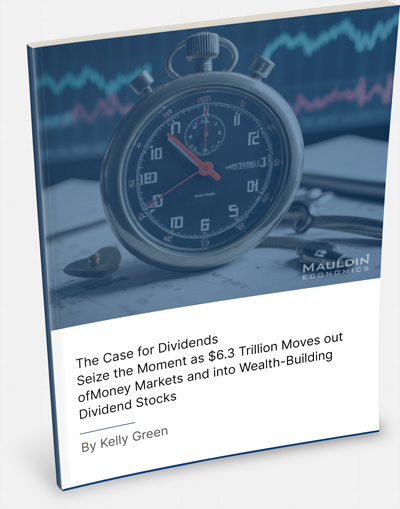
Cyber Crime, Big Data, and a Double-Digit Yield
-
 Kelly Green
Kelly Green
- |
- June 26, 2024
- |
- Comments
We live in a data-dependent world. We also live in a world vulnerable to cybercrime, which can cut our access to technologies we rely on every day.
Take the recent CDK Global attack. CDK software is used by nearly 15,000 car dealerships. It helps them manage vehicle acquisitions, sales, financing, insurance, repairs/maintenance, and even payroll.
Last Wednesday, the company was hit with a cyberattack. CDK could be forced to pay millions of dollars in ransom to the hackers.
I spoke with a friend who is a technician at one of the affected dealerships. They are handling repair and maintenance requests using carbon copy forms. I guess they were lucky and found a dusty box of them somewhere. And the employees are a little concerned about how they will get their paychecks for the week.
Other dealerships report filling out forms by hand to process sales. This includes sending “runners” to motor vehicle departments to complete registrations.
CDK’s software made handling all of these processes quick and simple.
The company says it will take days, not weeks, to fix the interruption. In the meantime, hundreds of thousands of employees and customers are dealing with the setback.
As Data Reliance Grows, So Will Attacks
Cybersecurity threats can range from email phishing attempts to ransomware and malware attacks. It also includes network and cloud vulnerabilities and data breaches.
As the global datasphere continues its blistering growth, don’t expect a slowdown in malicious cyber assaults.
In 2018, global data accounted for 33 zettabytes or 33 trillion gigabytes. Experts predict that number will expand to 175–200 zettabytes by 2025. Just looking at the top tech trends, that number will continue to balloon for years.
|
Artificial intelligence, quantum computing, expansion of 5G networks, virtual reality, and the Internet of Things will all contribute to the future of our lives in their own way. And they will all require an immense amount of data. Data that “bad guys” will attempt to exploit and turn into cold hard cash.
The cybersecurity industry was valued at $181 billion in 2023 and projected to grow 10% annually through 2030. It’s an industry that has carved its niche in a data-dependent future.
Think about it. Can our tech-reliant future exist without cybersecurity? I think not. That’s why I want some degree of portfolio exposure to it.
Collect a Whopping 9%
Dividend investors don’t have a lot of options with technology companies. This is especially true with our minimum yield target of 3.5%. The few tech companies that do pay a dividend usually cannot touch that level.
For cybersecurity stocks, our dividend options include Juniper Networks (JNPR) which yields 2.4% and Cisco Systems (CSCO) which yields 3.3%. Both are higher than normal yields for tech companies, but I still want more from my dividends.
Like what you're reading?
Get this free newsletter in your inbox every Wednesday! Read our privacy policy here.
These are usually growth stage business or those under financial stress. The BDCs not only provide financing but also operational assistance. BDCs give us access to investments we might not be able to invest in otherwise. That’s because many of these companies are private or have very thinly traded public shares.
One of my favorites is Hercules Capital Inc. (HTGC), which focuses primarily on the technology and life sciences spaces. This includes companies working in both the AI and cybersecurity sectors. We’ve owned it in the Yield Shark portfolio since August 2021. We’re collecting an 11.3% yield and are currently sitting on a 47% gain.
HTGC is slightly above my recommended buy up to price of $19.20. This ensured you locked in a 10% yield. However, at today’s stock price you’re still looking at a 9.6% yield. That is a great way to amplify your income stream.
If you’re looking for double-digit yield, we added another BDC to the Yield Shark portfolio yesterday. It also targets the technology and life science spaces. On top of its double-digit base yield, it regularly pays a supplement distribution that supercharges the yield. If you want all the details, check out Yield Shark backed by our 90-day money back guarantee.
|
For more income, now and in the future,

Kelly Green

 Kelly Green
Kelly Green
